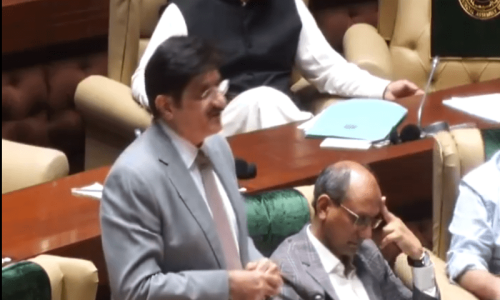KARACHI: Unlike many developed and better performing developing countries, Pakistan — or any of its provinces — has not yet formulated any policy to address the needs of its fast growing aged population, which could touch 45 million by 2025, it emerged on Thursday.
Officials in healthcare sectors in Islamabad and Sindh said that Pakistan — among the 15 countries with more than 10 million people — had already close to 18 million people aged 60 and above, which would rise to 45 million or more after 10 years.
The Sindh Senior Citizens Welfare Bill, 2014, is awaiting approval for a year but a similar bill has been languishing in the rulers’ corridors of Islamabad since 2007.
But until the law is finally passed and promulgated, serious social, economic and health problems are on the rise in Sindh and elsewhere in the country, say officials.
“Ours will be a significant contribution to the population of one billion people aged 60 and above in 10 years, but unlike others we have not yet formulated any strategy to address the needs of our elderly,” said a senior official in the health services ministry in Islamabad.
While the UN Population Fund (UNFPA) estimates 43.3 million elderly people in Pakistan by 2025, experts say the number could swell even more because of improving healthcare facilities — though in private sector — in the country’s expanding urban centres.
It says two out of every three people aged 60 or over, live in developing countries. By 2050, nearly four in five people aged 60 and over will live in the developing world.
In 2000, for the first time in history, there were more people over 60 than children below five. By 2050, for the first time, there will be more older people than children under 15. The number is projected to be two billion by 2050.
Globally, only one-third of countries, covering just 28pc of the global population, have comprehensive social protection schemes covering all branches of social security. The cost of a universal pension for over 60s in the developing countries will range between just 0.7pc and 2.6pc of GDP.
A paper written by Dr Sabeena Jalal and Dr Mustafa Z. Younis, which discusses lack of healthcare facilities for the aged, said there were close to 1,000 government hospitals and about 300 small and large hospitals in the private sector but most patients paid for medical services out of their pockets.
“Medical care is cheaper in government hospitals; however patients prefer private hospitals because of quality of service. Geriatrics is not recognised as a separate specialty resulting in the elderly being treated by general practitioners or other specialists,” said the report.
“The care received is often fragmented and there are not adequate inpatient rehabilitation centres for patients with strokes, fractures etc. Outpatient physical therapy services are, however, widely available but the use is suboptimal,” said the report quoting several surveys and reports on the subject. It said the elderly were high users of medical resources.
According to a report by health experts Sabzwari and Azhar in 2010, one in five patients at the tertiary care hospital in Karachi is elderly. It is estimated that at least 6–7pc of the elderly visiting geriatric clinics at the Aga Khan University Hospital Karachi are living alone with little assistance.
The pattern (loneliness) in the country’s biggest metropolis is attributed to children moving out of joint family system or migrating to other countries for better employment opportunities.
The 1998 census cites a 28pc disability rate of people aged 60 and older. Disability was defined as deafness (including mutism), crippled status, blindness and mental retardation.
The Jalal-Younis report referred to the Asian Audit (2009), a large ultrasound study carried out in Pakistan, which revealed that about 40 million people were projected to have osteopenia (a medical condition in which the protein and mineral content of bone tissue is reduced, but less severely than in osteoporosis) while numbers with osteoporosis was 10 million.
Another study on Pakistan reports that incidence of chronic illnesses rises with age requiring medical care. Fatigue, mobility impairment, dyspnoea (difficult or laboured breathing), urinary incontinence and visual impairment had the worst impact on the life of the aging individual and diabetes mellitus (28.1pc), hypertension (42.5pc), and arthritis (26.6pc) were the most frequently reported chronic ailments.
A survey among the geriatric population at a tertiary care teaching hospital in Karachi, a high-end hospital of a large cosmopolitan city showed the following results: the expectations of elderly patients from their physicians underlined the chance of discussing treatment options and allowing patients to make the final decision (79.2pc); physician’s holistic knowledge about the spectrum of care issues for geriatric patients (79.2pc); prescribing minimum possible medications (84.5pc); being given a realistic but optimistic picture of future health by physicians (85.5pc).
The Jalal-Younis report said like most developing countries, Pakistan had a frail provisioning for pensions. People primarily rely on the next generation to provide for them during their retirement.
Pakistan’s retirement age is 60 for men and 55 years for women. In 2007, Pakistan demographic survey reported that 5.7pc of male population was elderly and 7.04pc women population was above 55 years. Hence, 12.74 pc of the country’s population was retired.
It said that except for some private sector employees and the organised sector labour who were covered by funded pensions, a very large section of the population had no pension provisioning — totally dependent on joint family support system.
Published in Dawn, February 23rd, 2015
On a mobile phone? Get the Dawn Mobile App: Apple Store | Google Play
















































